Work Based Project: Interpersonal Skills Analysis and Development
VerifiedAdded on 2020/01/16
|13
|4263
|175
Report
AI Summary
This report presents a work-based project analyzing interpersonal skills, specifically focusing on a teacher's self-assessment. The introduction highlights the importance of interpersonal skills in professional and personal life, defining various skills like problem-solving, team playing, assertiveness, and positivity. The assignment includes an analysis of the teacher's strengths, identifying strong assertiveness skills, including strategies for implementation such as believing in thoughts, practicing assertive reactions, and identifying appropriate methods. The report then analyzes areas for improvement, suggesting techniques like fogging, the stuck record, positive inquiry, and negative inquiry to refine skills. The report concludes with a development plan aimed at enhancing interpersonal effectiveness through continuous practice and application of these techniques in real-life scenarios.
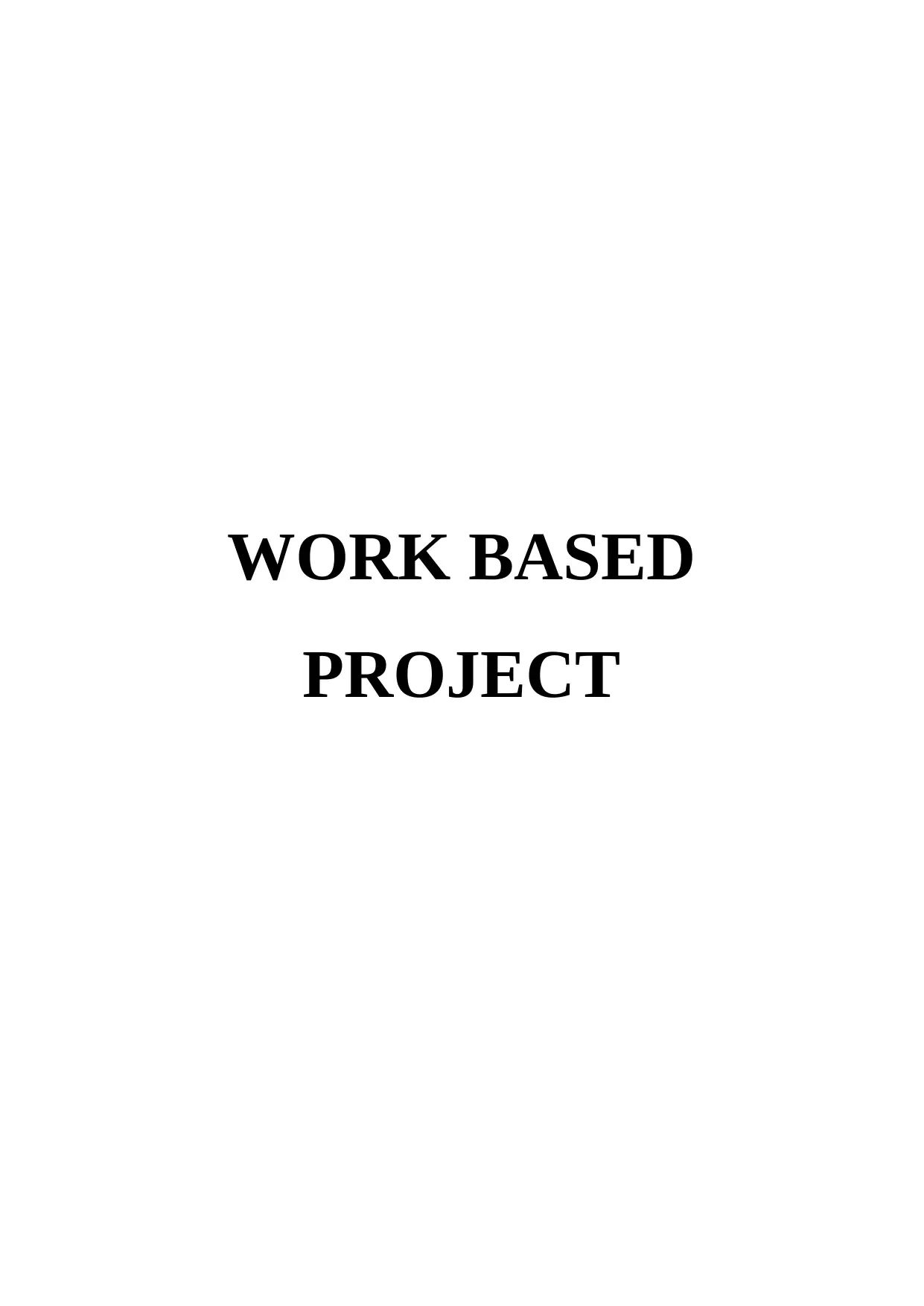
WORK BASED
PROJECT
PROJECT
Paraphrase This Document
Need a fresh take? Get an instant paraphrase of this document with our AI Paraphraser
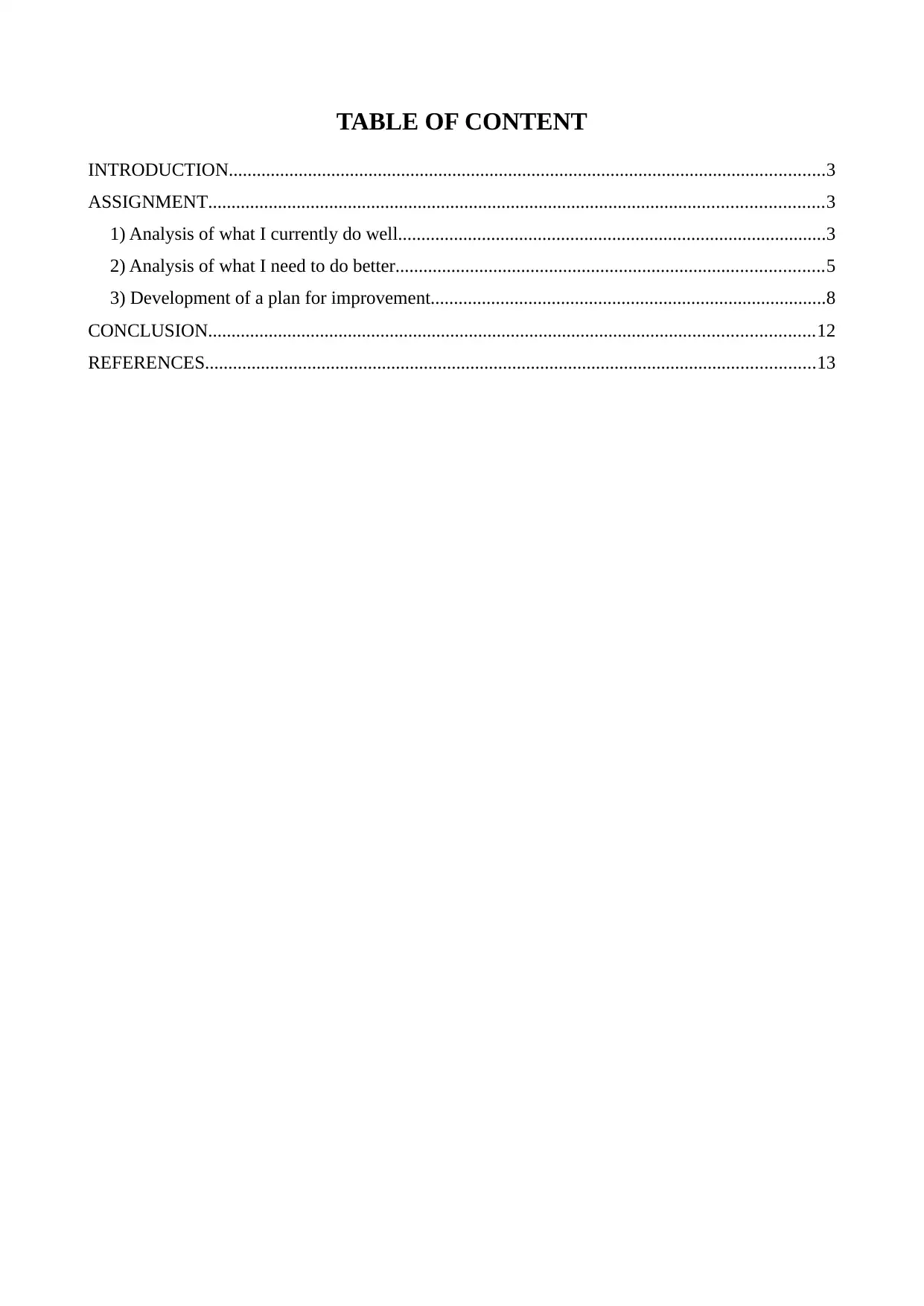
TABLE OF CONTENT
INTRODUCTION................................................................................................................................3
ASSIGNMENT....................................................................................................................................3
1) Analysis of what I currently do well............................................................................................3
2) Analysis of what I need to do better............................................................................................5
3) Development of a plan for improvement.....................................................................................8
CONCLUSION..................................................................................................................................12
REFERENCES...................................................................................................................................13
INTRODUCTION................................................................................................................................3
ASSIGNMENT....................................................................................................................................3
1) Analysis of what I currently do well............................................................................................3
2) Analysis of what I need to do better............................................................................................5
3) Development of a plan for improvement.....................................................................................8
CONCLUSION..................................................................................................................................12
REFERENCES...................................................................................................................................13
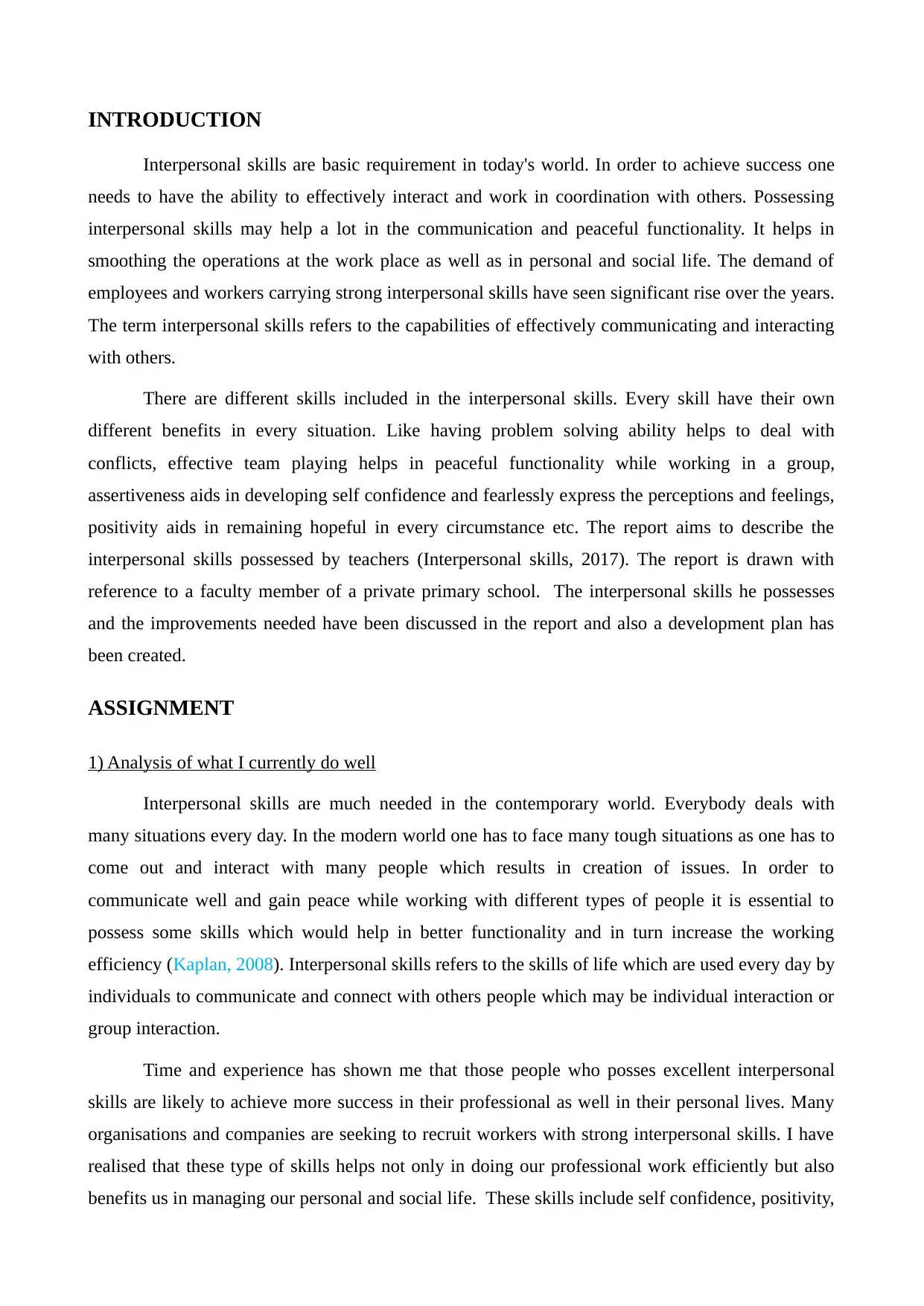
INTRODUCTION
Interpersonal skills are basic requirement in today's world. In order to achieve success one
needs to have the ability to effectively interact and work in coordination with others. Possessing
interpersonal skills may help a lot in the communication and peaceful functionality. It helps in
smoothing the operations at the work place as well as in personal and social life. The demand of
employees and workers carrying strong interpersonal skills have seen significant rise over the years.
The term interpersonal skills refers to the capabilities of effectively communicating and interacting
with others.
There are different skills included in the interpersonal skills. Every skill have their own
different benefits in every situation. Like having problem solving ability helps to deal with
conflicts, effective team playing helps in peaceful functionality while working in a group,
assertiveness aids in developing self confidence and fearlessly express the perceptions and feelings,
positivity aids in remaining hopeful in every circumstance etc. The report aims to describe the
interpersonal skills possessed by teachers (Interpersonal skills, 2017). The report is drawn with
reference to a faculty member of a private primary school. The interpersonal skills he possesses
and the improvements needed have been discussed in the report and also a development plan has
been created.
ASSIGNMENT
1) Analysis of what I currently do well
Interpersonal skills are much needed in the contemporary world. Everybody deals with
many situations every day. In the modern world one has to face many tough situations as one has to
come out and interact with many people which results in creation of issues. In order to
communicate well and gain peace while working with different types of people it is essential to
possess some skills which would help in better functionality and in turn increase the working
efficiency (Kaplan, 2008). Interpersonal skills refers to the skills of life which are used every day by
individuals to communicate and connect with others people which may be individual interaction or
group interaction.
Time and experience has shown me that those people who posses excellent interpersonal
skills are likely to achieve more success in their professional as well in their personal lives. Many
organisations and companies are seeking to recruit workers with strong interpersonal skills. I have
realised that these type of skills helps not only in doing our professional work efficiently but also
benefits us in managing our personal and social life. These skills include self confidence, positivity,
Interpersonal skills are basic requirement in today's world. In order to achieve success one
needs to have the ability to effectively interact and work in coordination with others. Possessing
interpersonal skills may help a lot in the communication and peaceful functionality. It helps in
smoothing the operations at the work place as well as in personal and social life. The demand of
employees and workers carrying strong interpersonal skills have seen significant rise over the years.
The term interpersonal skills refers to the capabilities of effectively communicating and interacting
with others.
There are different skills included in the interpersonal skills. Every skill have their own
different benefits in every situation. Like having problem solving ability helps to deal with
conflicts, effective team playing helps in peaceful functionality while working in a group,
assertiveness aids in developing self confidence and fearlessly express the perceptions and feelings,
positivity aids in remaining hopeful in every circumstance etc. The report aims to describe the
interpersonal skills possessed by teachers (Interpersonal skills, 2017). The report is drawn with
reference to a faculty member of a private primary school. The interpersonal skills he possesses
and the improvements needed have been discussed in the report and also a development plan has
been created.
ASSIGNMENT
1) Analysis of what I currently do well
Interpersonal skills are much needed in the contemporary world. Everybody deals with
many situations every day. In the modern world one has to face many tough situations as one has to
come out and interact with many people which results in creation of issues. In order to
communicate well and gain peace while working with different types of people it is essential to
possess some skills which would help in better functionality and in turn increase the working
efficiency (Kaplan, 2008). Interpersonal skills refers to the skills of life which are used every day by
individuals to communicate and connect with others people which may be individual interaction or
group interaction.
Time and experience has shown me that those people who posses excellent interpersonal
skills are likely to achieve more success in their professional as well in their personal lives. Many
organisations and companies are seeking to recruit workers with strong interpersonal skills. I have
realised that these type of skills helps not only in doing our professional work efficiently but also
benefits us in managing our personal and social life. These skills include self confidence, positivity,
⊘ This is a preview!⊘
Do you want full access?
Subscribe today to unlock all pages.

Trusted by 1+ million students worldwide
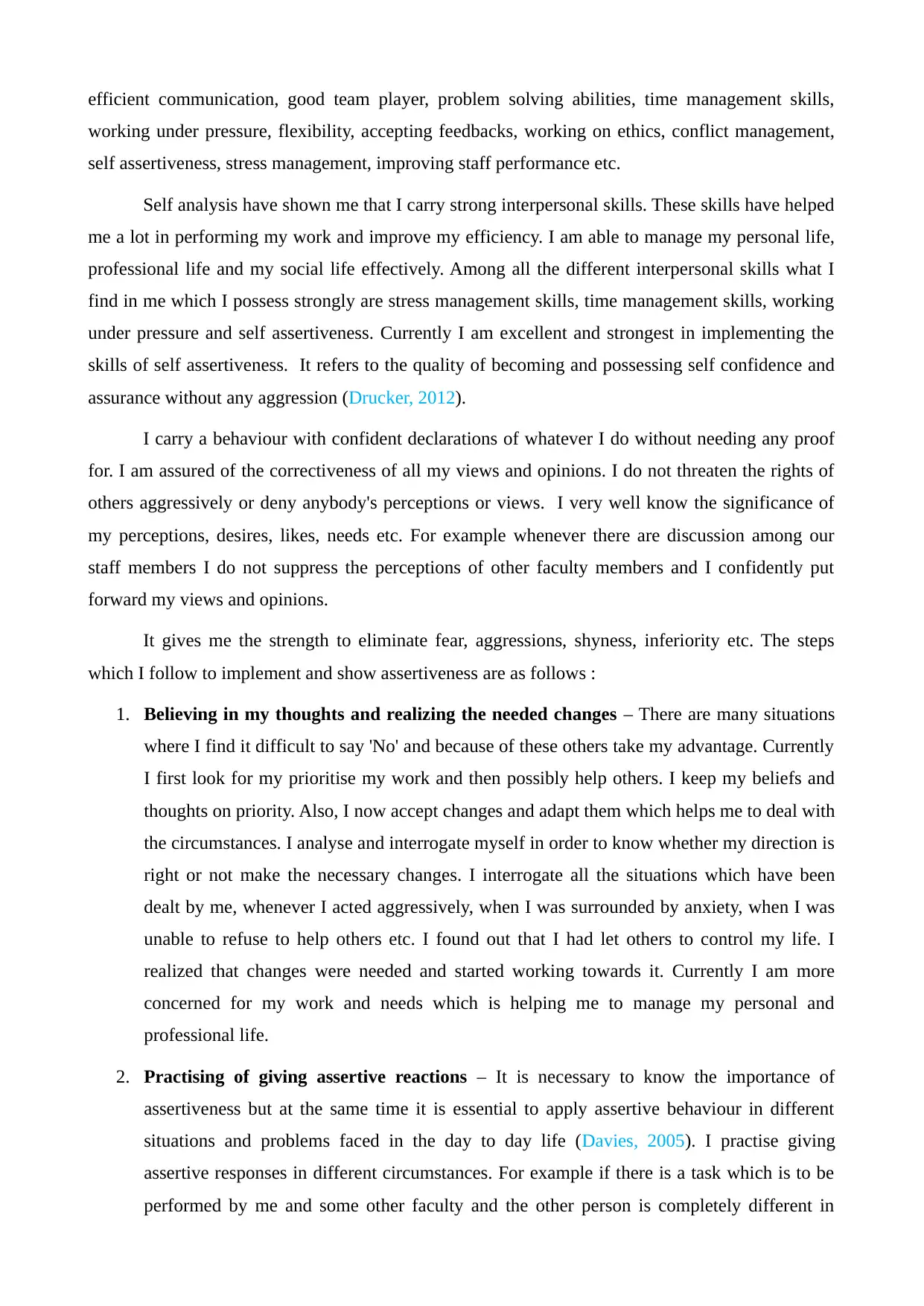
efficient communication, good team player, problem solving abilities, time management skills,
working under pressure, flexibility, accepting feedbacks, working on ethics, conflict management,
self assertiveness, stress management, improving staff performance etc.
Self analysis have shown me that I carry strong interpersonal skills. These skills have helped
me a lot in performing my work and improve my efficiency. I am able to manage my personal life,
professional life and my social life effectively. Among all the different interpersonal skills what I
find in me which I possess strongly are stress management skills, time management skills, working
under pressure and self assertiveness. Currently I am excellent and strongest in implementing the
skills of self assertiveness. It refers to the quality of becoming and possessing self confidence and
assurance without any aggression (Drucker, 2012).
I carry a behaviour with confident declarations of whatever I do without needing any proof
for. I am assured of the correctiveness of all my views and opinions. I do not threaten the rights of
others aggressively or deny anybody's perceptions or views. I very well know the significance of
my perceptions, desires, likes, needs etc. For example whenever there are discussion among our
staff members I do not suppress the perceptions of other faculty members and I confidently put
forward my views and opinions.
It gives me the strength to eliminate fear, aggressions, shyness, inferiority etc. The steps
which I follow to implement and show assertiveness are as follows :
1. Believing in my thoughts and realizing the needed changes – There are many situations
where I find it difficult to say 'No' and because of these others take my advantage. Currently
I first look for my prioritise my work and then possibly help others. I keep my beliefs and
thoughts on priority. Also, I now accept changes and adapt them which helps me to deal with
the circumstances. I analyse and interrogate myself in order to know whether my direction is
right or not make the necessary changes. I interrogate all the situations which have been
dealt by me, whenever I acted aggressively, when I was surrounded by anxiety, when I was
unable to refuse to help others etc. I found out that I had let others to control my life. I
realized that changes were needed and started working towards it. Currently I am more
concerned for my work and needs which is helping me to manage my personal and
professional life.
2. Practising of giving assertive reactions – It is necessary to know the importance of
assertiveness but at the same time it is essential to apply assertive behaviour in different
situations and problems faced in the day to day life (Davies, 2005). I practise giving
assertive responses in different circumstances. For example if there is a task which is to be
performed by me and some other faculty and the other person is completely different in
working under pressure, flexibility, accepting feedbacks, working on ethics, conflict management,
self assertiveness, stress management, improving staff performance etc.
Self analysis have shown me that I carry strong interpersonal skills. These skills have helped
me a lot in performing my work and improve my efficiency. I am able to manage my personal life,
professional life and my social life effectively. Among all the different interpersonal skills what I
find in me which I possess strongly are stress management skills, time management skills, working
under pressure and self assertiveness. Currently I am excellent and strongest in implementing the
skills of self assertiveness. It refers to the quality of becoming and possessing self confidence and
assurance without any aggression (Drucker, 2012).
I carry a behaviour with confident declarations of whatever I do without needing any proof
for. I am assured of the correctiveness of all my views and opinions. I do not threaten the rights of
others aggressively or deny anybody's perceptions or views. I very well know the significance of
my perceptions, desires, likes, needs etc. For example whenever there are discussion among our
staff members I do not suppress the perceptions of other faculty members and I confidently put
forward my views and opinions.
It gives me the strength to eliminate fear, aggressions, shyness, inferiority etc. The steps
which I follow to implement and show assertiveness are as follows :
1. Believing in my thoughts and realizing the needed changes – There are many situations
where I find it difficult to say 'No' and because of these others take my advantage. Currently
I first look for my prioritise my work and then possibly help others. I keep my beliefs and
thoughts on priority. Also, I now accept changes and adapt them which helps me to deal with
the circumstances. I analyse and interrogate myself in order to know whether my direction is
right or not make the necessary changes. I interrogate all the situations which have been
dealt by me, whenever I acted aggressively, when I was surrounded by anxiety, when I was
unable to refuse to help others etc. I found out that I had let others to control my life. I
realized that changes were needed and started working towards it. Currently I am more
concerned for my work and needs which is helping me to manage my personal and
professional life.
2. Practising of giving assertive reactions – It is necessary to know the importance of
assertiveness but at the same time it is essential to apply assertive behaviour in different
situations and problems faced in the day to day life (Davies, 2005). I practise giving
assertive responses in different circumstances. For example if there is a task which is to be
performed by me and some other faculty and the other person is completely different in
Paraphrase This Document
Need a fresh take? Get an instant paraphrase of this document with our AI Paraphraser
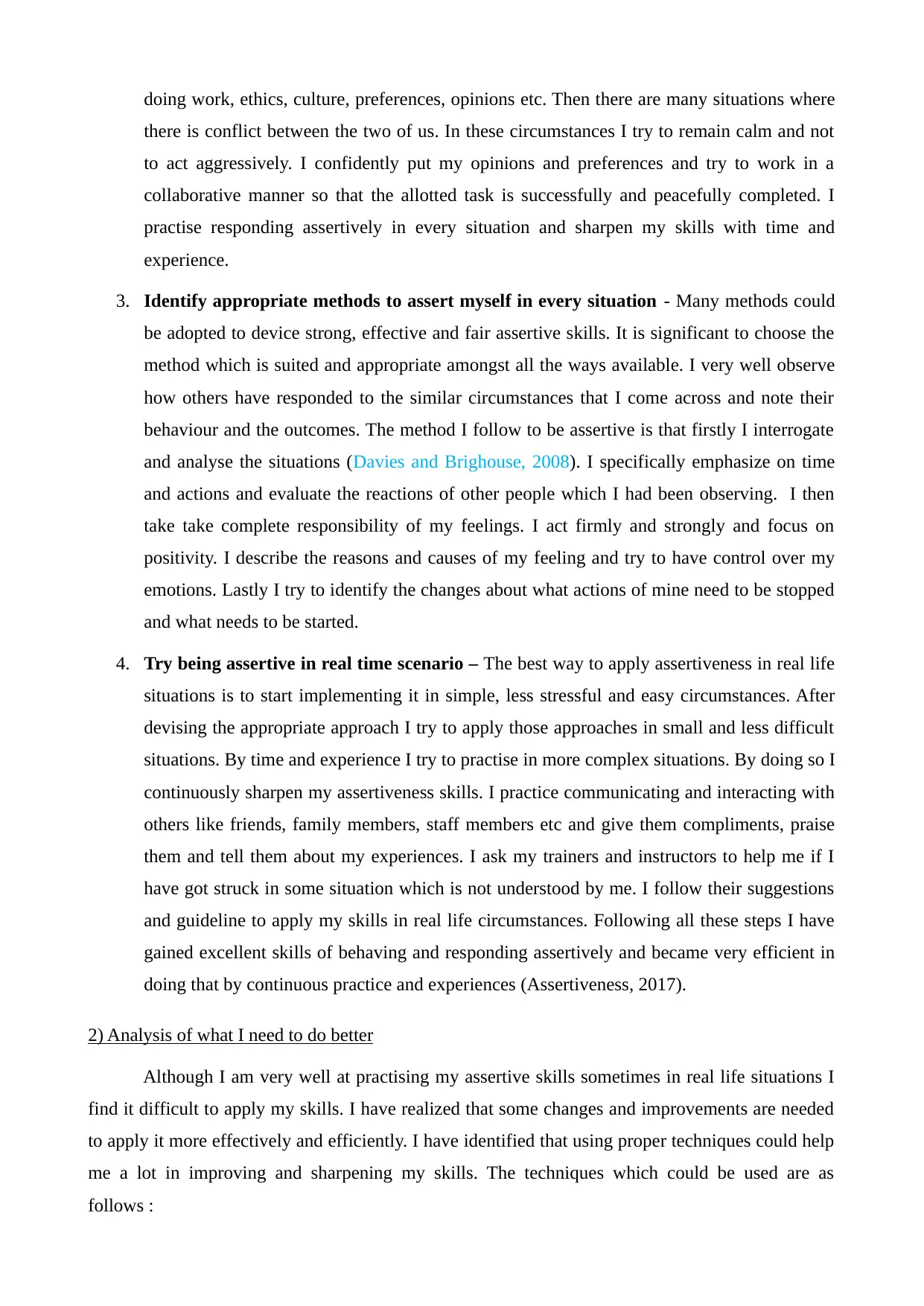
doing work, ethics, culture, preferences, opinions etc. Then there are many situations where
there is conflict between the two of us. In these circumstances I try to remain calm and not
to act aggressively. I confidently put my opinions and preferences and try to work in a
collaborative manner so that the allotted task is successfully and peacefully completed. I
practise responding assertively in every situation and sharpen my skills with time and
experience.
3. Identify appropriate methods to assert myself in every situation - Many methods could
be adopted to device strong, effective and fair assertive skills. It is significant to choose the
method which is suited and appropriate amongst all the ways available. I very well observe
how others have responded to the similar circumstances that I come across and note their
behaviour and the outcomes. The method I follow to be assertive is that firstly I interrogate
and analyse the situations (Davies and Brighouse, 2008). I specifically emphasize on time
and actions and evaluate the reactions of other people which I had been observing. I then
take take complete responsibility of my feelings. I act firmly and strongly and focus on
positivity. I describe the reasons and causes of my feeling and try to have control over my
emotions. Lastly I try to identify the changes about what actions of mine need to be stopped
and what needs to be started.
4. Try being assertive in real time scenario – The best way to apply assertiveness in real life
situations is to start implementing it in simple, less stressful and easy circumstances. After
devising the appropriate approach I try to apply those approaches in small and less difficult
situations. By time and experience I try to practise in more complex situations. By doing so I
continuously sharpen my assertiveness skills. I practice communicating and interacting with
others like friends, family members, staff members etc and give them compliments, praise
them and tell them about my experiences. I ask my trainers and instructors to help me if I
have got struck in some situation which is not understood by me. I follow their suggestions
and guideline to apply my skills in real life circumstances. Following all these steps I have
gained excellent skills of behaving and responding assertively and became very efficient in
doing that by continuous practice and experiences (Assertiveness, 2017).
2) Analysis of what I need to do better
Although I am very well at practising my assertive skills sometimes in real life situations I
find it difficult to apply my skills. I have realized that some changes and improvements are needed
to apply it more effectively and efficiently. I have identified that using proper techniques could help
me a lot in improving and sharpening my skills. The techniques which could be used are as
follows :
there is conflict between the two of us. In these circumstances I try to remain calm and not
to act aggressively. I confidently put my opinions and preferences and try to work in a
collaborative manner so that the allotted task is successfully and peacefully completed. I
practise responding assertively in every situation and sharpen my skills with time and
experience.
3. Identify appropriate methods to assert myself in every situation - Many methods could
be adopted to device strong, effective and fair assertive skills. It is significant to choose the
method which is suited and appropriate amongst all the ways available. I very well observe
how others have responded to the similar circumstances that I come across and note their
behaviour and the outcomes. The method I follow to be assertive is that firstly I interrogate
and analyse the situations (Davies and Brighouse, 2008). I specifically emphasize on time
and actions and evaluate the reactions of other people which I had been observing. I then
take take complete responsibility of my feelings. I act firmly and strongly and focus on
positivity. I describe the reasons and causes of my feeling and try to have control over my
emotions. Lastly I try to identify the changes about what actions of mine need to be stopped
and what needs to be started.
4. Try being assertive in real time scenario – The best way to apply assertiveness in real life
situations is to start implementing it in simple, less stressful and easy circumstances. After
devising the appropriate approach I try to apply those approaches in small and less difficult
situations. By time and experience I try to practise in more complex situations. By doing so I
continuously sharpen my assertiveness skills. I practice communicating and interacting with
others like friends, family members, staff members etc and give them compliments, praise
them and tell them about my experiences. I ask my trainers and instructors to help me if I
have got struck in some situation which is not understood by me. I follow their suggestions
and guideline to apply my skills in real life circumstances. Following all these steps I have
gained excellent skills of behaving and responding assertively and became very efficient in
doing that by continuous practice and experiences (Assertiveness, 2017).
2) Analysis of what I need to do better
Although I am very well at practising my assertive skills sometimes in real life situations I
find it difficult to apply my skills. I have realized that some changes and improvements are needed
to apply it more effectively and efficiently. I have identified that using proper techniques could help
me a lot in improving and sharpening my skills. The techniques which could be used are as
follows :
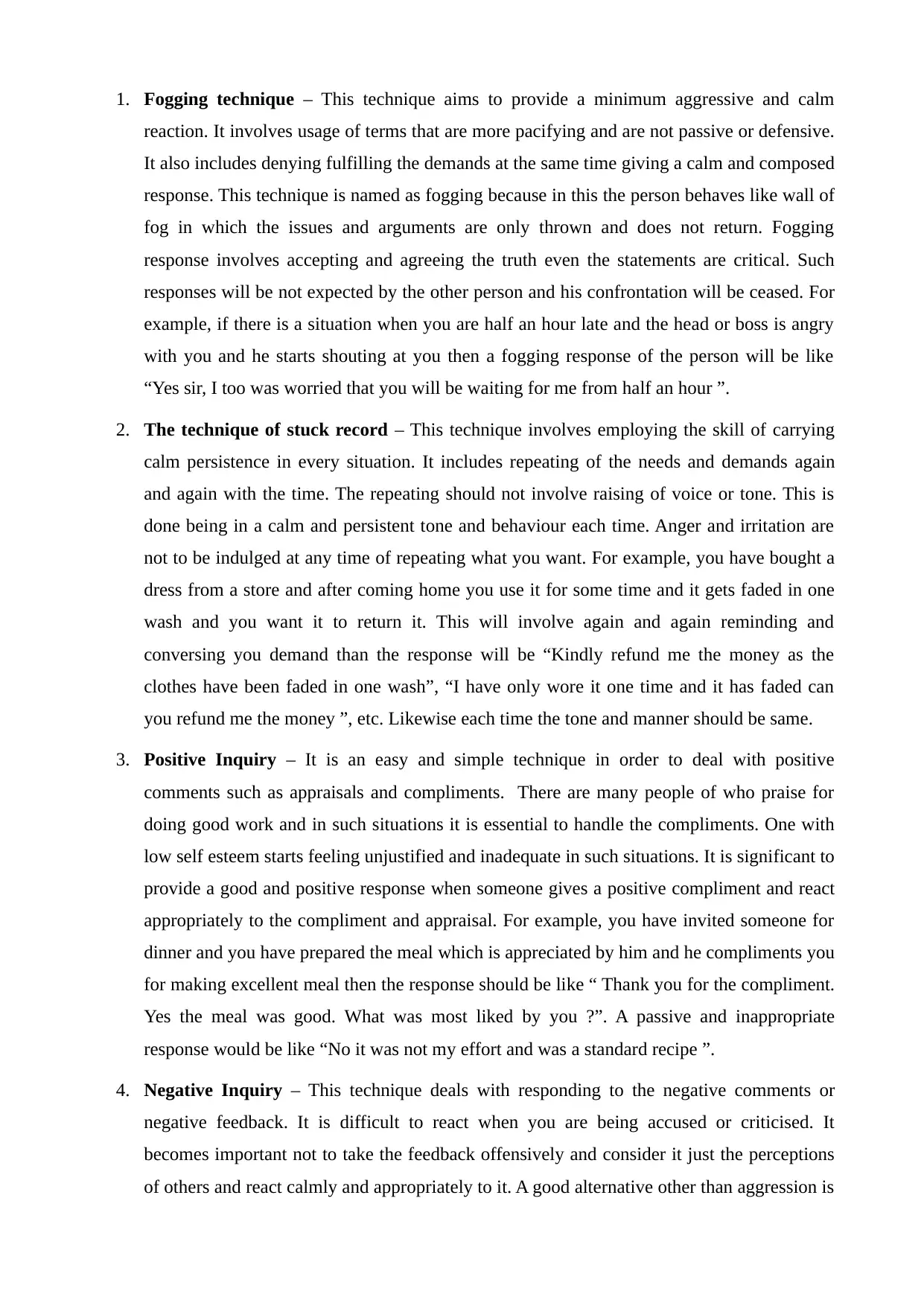
1. Fogging technique – This technique aims to provide a minimum aggressive and calm
reaction. It involves usage of terms that are more pacifying and are not passive or defensive.
It also includes denying fulfilling the demands at the same time giving a calm and composed
response. This technique is named as fogging because in this the person behaves like wall of
fog in which the issues and arguments are only thrown and does not return. Fogging
response involves accepting and agreeing the truth even the statements are critical. Such
responses will be not expected by the other person and his confrontation will be ceased. For
example, if there is a situation when you are half an hour late and the head or boss is angry
with you and he starts shouting at you then a fogging response of the person will be like
“Yes sir, I too was worried that you will be waiting for me from half an hour ”.
2. The technique of stuck record – This technique involves employing the skill of carrying
calm persistence in every situation. It includes repeating of the needs and demands again
and again with the time. The repeating should not involve raising of voice or tone. This is
done being in a calm and persistent tone and behaviour each time. Anger and irritation are
not to be indulged at any time of repeating what you want. For example, you have bought a
dress from a store and after coming home you use it for some time and it gets faded in one
wash and you want it to return it. This will involve again and again reminding and
conversing you demand than the response will be “Kindly refund me the money as the
clothes have been faded in one wash”, “I have only wore it one time and it has faded can
you refund me the money ”, etc. Likewise each time the tone and manner should be same.
3. Positive Inquiry – It is an easy and simple technique in order to deal with positive
comments such as appraisals and compliments. There are many people of who praise for
doing good work and in such situations it is essential to handle the compliments. One with
low self esteem starts feeling unjustified and inadequate in such situations. It is significant to
provide a good and positive response when someone gives a positive compliment and react
appropriately to the compliment and appraisal. For example, you have invited someone for
dinner and you have prepared the meal which is appreciated by him and he compliments you
for making excellent meal then the response should be like “ Thank you for the compliment.
Yes the meal was good. What was most liked by you ?”. A passive and inappropriate
response would be like “No it was not my effort and was a standard recipe ”.
4. Negative Inquiry – This technique deals with responding to the negative comments or
negative feedback. It is difficult to react when you are being accused or criticised. It
becomes important not to take the feedback offensively and consider it just the perceptions
of others and react calmly and appropriately to it. A good alternative other than aggression is
reaction. It involves usage of terms that are more pacifying and are not passive or defensive.
It also includes denying fulfilling the demands at the same time giving a calm and composed
response. This technique is named as fogging because in this the person behaves like wall of
fog in which the issues and arguments are only thrown and does not return. Fogging
response involves accepting and agreeing the truth even the statements are critical. Such
responses will be not expected by the other person and his confrontation will be ceased. For
example, if there is a situation when you are half an hour late and the head or boss is angry
with you and he starts shouting at you then a fogging response of the person will be like
“Yes sir, I too was worried that you will be waiting for me from half an hour ”.
2. The technique of stuck record – This technique involves employing the skill of carrying
calm persistence in every situation. It includes repeating of the needs and demands again
and again with the time. The repeating should not involve raising of voice or tone. This is
done being in a calm and persistent tone and behaviour each time. Anger and irritation are
not to be indulged at any time of repeating what you want. For example, you have bought a
dress from a store and after coming home you use it for some time and it gets faded in one
wash and you want it to return it. This will involve again and again reminding and
conversing you demand than the response will be “Kindly refund me the money as the
clothes have been faded in one wash”, “I have only wore it one time and it has faded can
you refund me the money ”, etc. Likewise each time the tone and manner should be same.
3. Positive Inquiry – It is an easy and simple technique in order to deal with positive
comments such as appraisals and compliments. There are many people of who praise for
doing good work and in such situations it is essential to handle the compliments. One with
low self esteem starts feeling unjustified and inadequate in such situations. It is significant to
provide a good and positive response when someone gives a positive compliment and react
appropriately to the compliment and appraisal. For example, you have invited someone for
dinner and you have prepared the meal which is appreciated by him and he compliments you
for making excellent meal then the response should be like “ Thank you for the compliment.
Yes the meal was good. What was most liked by you ?”. A passive and inappropriate
response would be like “No it was not my effort and was a standard recipe ”.
4. Negative Inquiry – This technique deals with responding to the negative comments or
negative feedback. It is difficult to react when you are being accused or criticised. It
becomes important not to take the feedback offensively and consider it just the perceptions
of others and react calmly and appropriately to it. A good alternative other than aggression is
⊘ This is a preview!⊘
Do you want full access?
Subscribe today to unlock all pages.

Trusted by 1+ million students worldwide
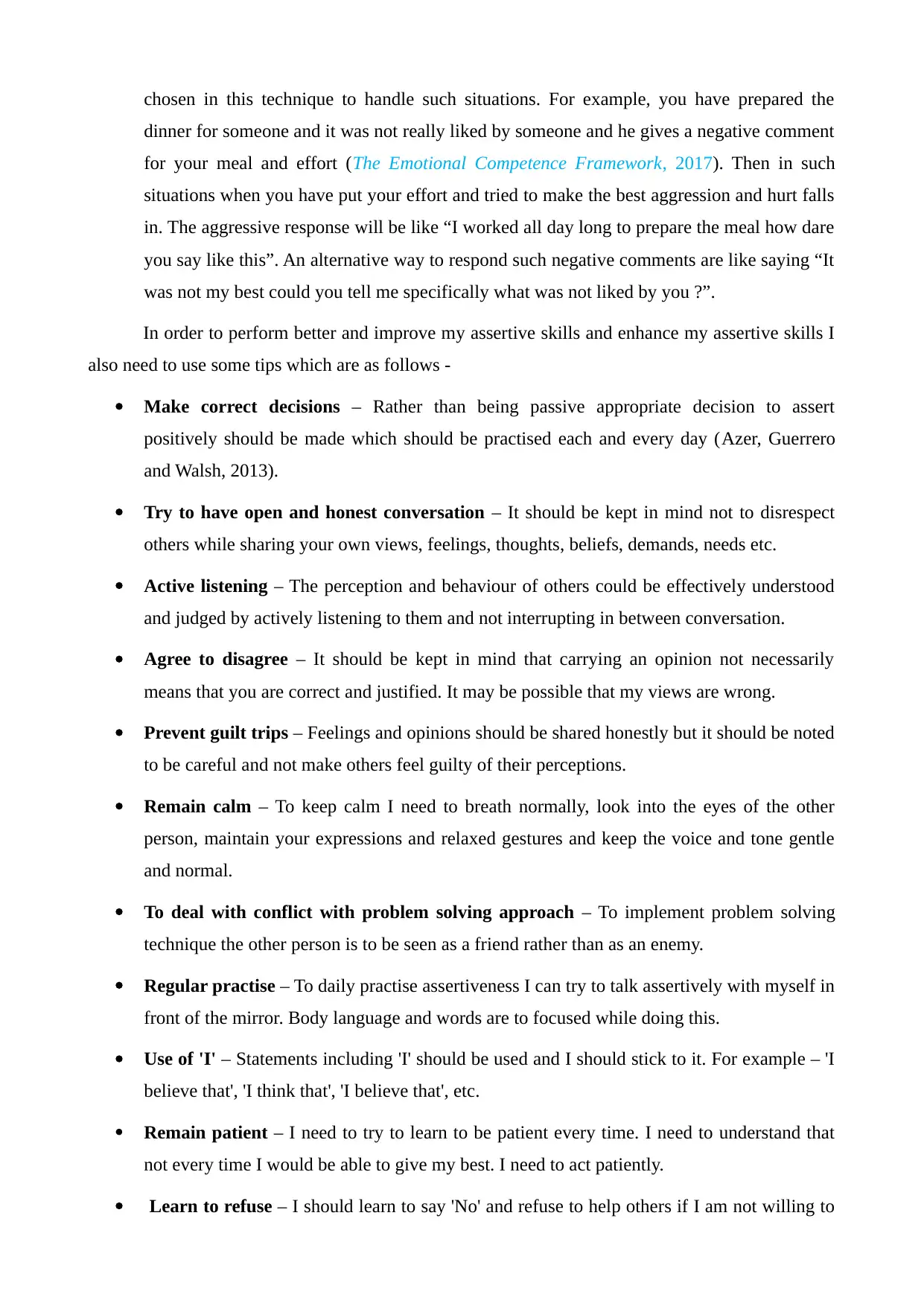
chosen in this technique to handle such situations. For example, you have prepared the
dinner for someone and it was not really liked by someone and he gives a negative comment
for your meal and effort (The Emotional Competence Framework, 2017). Then in such
situations when you have put your effort and tried to make the best aggression and hurt falls
in. The aggressive response will be like “I worked all day long to prepare the meal how dare
you say like this”. An alternative way to respond such negative comments are like saying “It
was not my best could you tell me specifically what was not liked by you ?”.
In order to perform better and improve my assertive skills and enhance my assertive skills I
also need to use some tips which are as follows -
Make correct decisions – Rather than being passive appropriate decision to assert
positively should be made which should be practised each and every day (Azer, Guerrero
and Walsh, 2013).
Try to have open and honest conversation – It should be kept in mind not to disrespect
others while sharing your own views, feelings, thoughts, beliefs, demands, needs etc.
Active listening – The perception and behaviour of others could be effectively understood
and judged by actively listening to them and not interrupting in between conversation.
Agree to disagree – It should be kept in mind that carrying an opinion not necessarily
means that you are correct and justified. It may be possible that my views are wrong.
Prevent guilt trips – Feelings and opinions should be shared honestly but it should be noted
to be careful and not make others feel guilty of their perceptions.
Remain calm – To keep calm I need to breath normally, look into the eyes of the other
person, maintain your expressions and relaxed gestures and keep the voice and tone gentle
and normal.
To deal with conflict with problem solving approach – To implement problem solving
technique the other person is to be seen as a friend rather than as an enemy.
Regular practise – To daily practise assertiveness I can try to talk assertively with myself in
front of the mirror. Body language and words are to focused while doing this.
Use of 'I' – Statements including 'I' should be used and I should stick to it. For example – 'I
believe that', 'I think that', 'I believe that', etc.
Remain patient – I need to try to learn to be patient every time. I need to understand that
not every time I would be able to give my best. I need to act patiently.
Learn to refuse – I should learn to say 'No' and refuse to help others if I am not willing to
dinner for someone and it was not really liked by someone and he gives a negative comment
for your meal and effort (The Emotional Competence Framework, 2017). Then in such
situations when you have put your effort and tried to make the best aggression and hurt falls
in. The aggressive response will be like “I worked all day long to prepare the meal how dare
you say like this”. An alternative way to respond such negative comments are like saying “It
was not my best could you tell me specifically what was not liked by you ?”.
In order to perform better and improve my assertive skills and enhance my assertive skills I
also need to use some tips which are as follows -
Make correct decisions – Rather than being passive appropriate decision to assert
positively should be made which should be practised each and every day (Azer, Guerrero
and Walsh, 2013).
Try to have open and honest conversation – It should be kept in mind not to disrespect
others while sharing your own views, feelings, thoughts, beliefs, demands, needs etc.
Active listening – The perception and behaviour of others could be effectively understood
and judged by actively listening to them and not interrupting in between conversation.
Agree to disagree – It should be kept in mind that carrying an opinion not necessarily
means that you are correct and justified. It may be possible that my views are wrong.
Prevent guilt trips – Feelings and opinions should be shared honestly but it should be noted
to be careful and not make others feel guilty of their perceptions.
Remain calm – To keep calm I need to breath normally, look into the eyes of the other
person, maintain your expressions and relaxed gestures and keep the voice and tone gentle
and normal.
To deal with conflict with problem solving approach – To implement problem solving
technique the other person is to be seen as a friend rather than as an enemy.
Regular practise – To daily practise assertiveness I can try to talk assertively with myself in
front of the mirror. Body language and words are to focused while doing this.
Use of 'I' – Statements including 'I' should be used and I should stick to it. For example – 'I
believe that', 'I think that', 'I believe that', etc.
Remain patient – I need to try to learn to be patient every time. I need to understand that
not every time I would be able to give my best. I need to act patiently.
Learn to refuse – I should learn to say 'No' and refuse to help others if I am not willing to
Paraphrase This Document
Need a fresh take? Get an instant paraphrase of this document with our AI Paraphraser
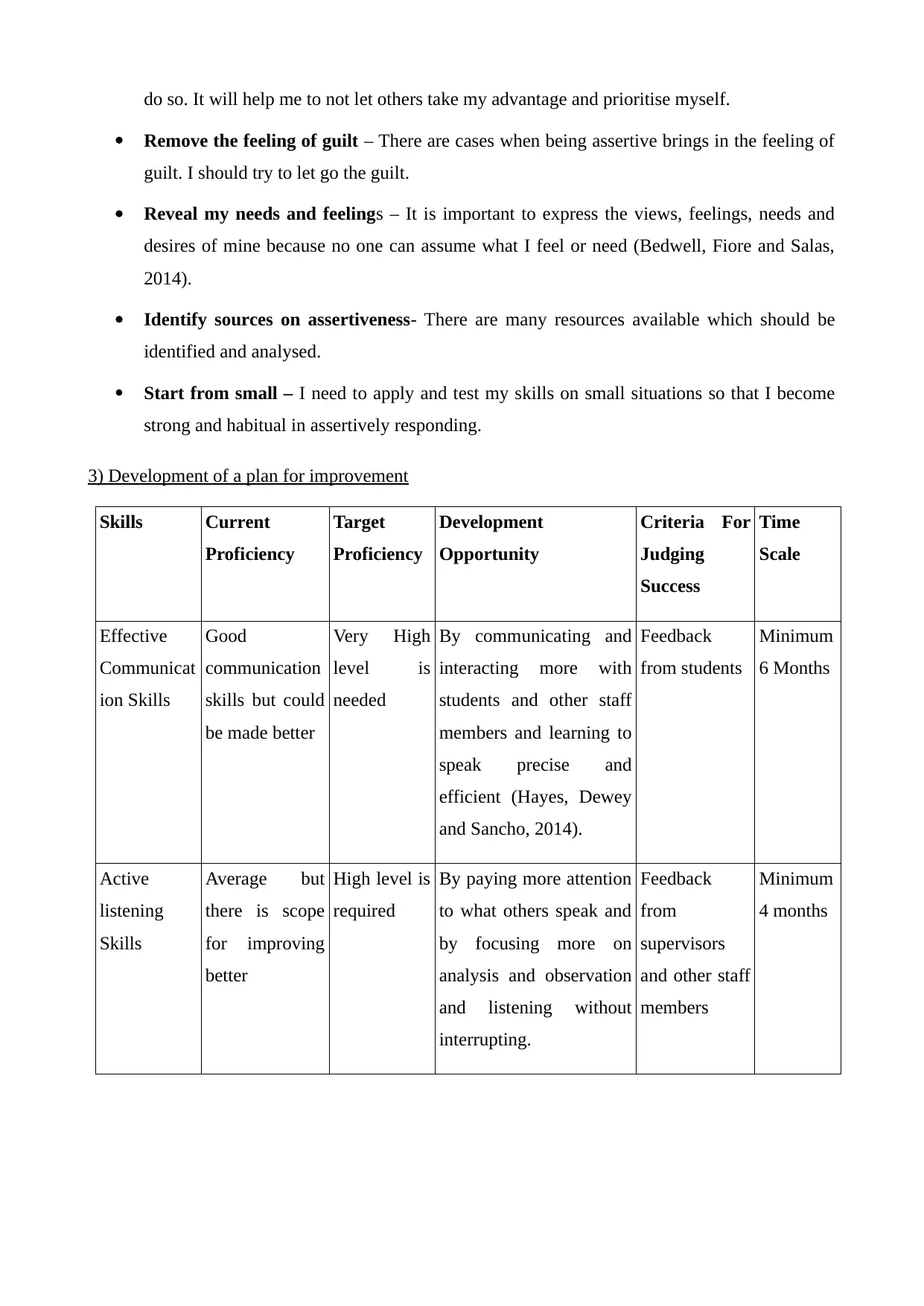
do so. It will help me to not let others take my advantage and prioritise myself.
Remove the feeling of guilt – There are cases when being assertive brings in the feeling of
guilt. I should try to let go the guilt.
Reveal my needs and feelings – It is important to express the views, feelings, needs and
desires of mine because no one can assume what I feel or need (Bedwell, Fiore and Salas,
2014).
Identify sources on assertiveness- There are many resources available which should be
identified and analysed.
Start from small – I need to apply and test my skills on small situations so that I become
strong and habitual in assertively responding.
3) Development of a plan for improvement
Skills Current
Proficiency
Target
Proficiency
Development
Opportunity
Criteria For
Judging
Success
Time
Scale
Effective
Communicat
ion Skills
Good
communication
skills but could
be made better
Very High
level is
needed
By communicating and
interacting more with
students and other staff
members and learning to
speak precise and
efficient (Hayes, Dewey
and Sancho, 2014).
Feedback
from students
Minimum
6 Months
Active
listening
Skills
Average but
there is scope
for improving
better
High level is
required
By paying more attention
to what others speak and
by focusing more on
analysis and observation
and listening without
interrupting.
Feedback
from
supervisors
and other staff
members
Minimum
4 months
Remove the feeling of guilt – There are cases when being assertive brings in the feeling of
guilt. I should try to let go the guilt.
Reveal my needs and feelings – It is important to express the views, feelings, needs and
desires of mine because no one can assume what I feel or need (Bedwell, Fiore and Salas,
2014).
Identify sources on assertiveness- There are many resources available which should be
identified and analysed.
Start from small – I need to apply and test my skills on small situations so that I become
strong and habitual in assertively responding.
3) Development of a plan for improvement
Skills Current
Proficiency
Target
Proficiency
Development
Opportunity
Criteria For
Judging
Success
Time
Scale
Effective
Communicat
ion Skills
Good
communication
skills but could
be made better
Very High
level is
needed
By communicating and
interacting more with
students and other staff
members and learning to
speak precise and
efficient (Hayes, Dewey
and Sancho, 2014).
Feedback
from students
Minimum
6 Months
Active
listening
Skills
Average but
there is scope
for improving
better
High level is
required
By paying more attention
to what others speak and
by focusing more on
analysis and observation
and listening without
interrupting.
Feedback
from
supervisors
and other staff
members
Minimum
4 months
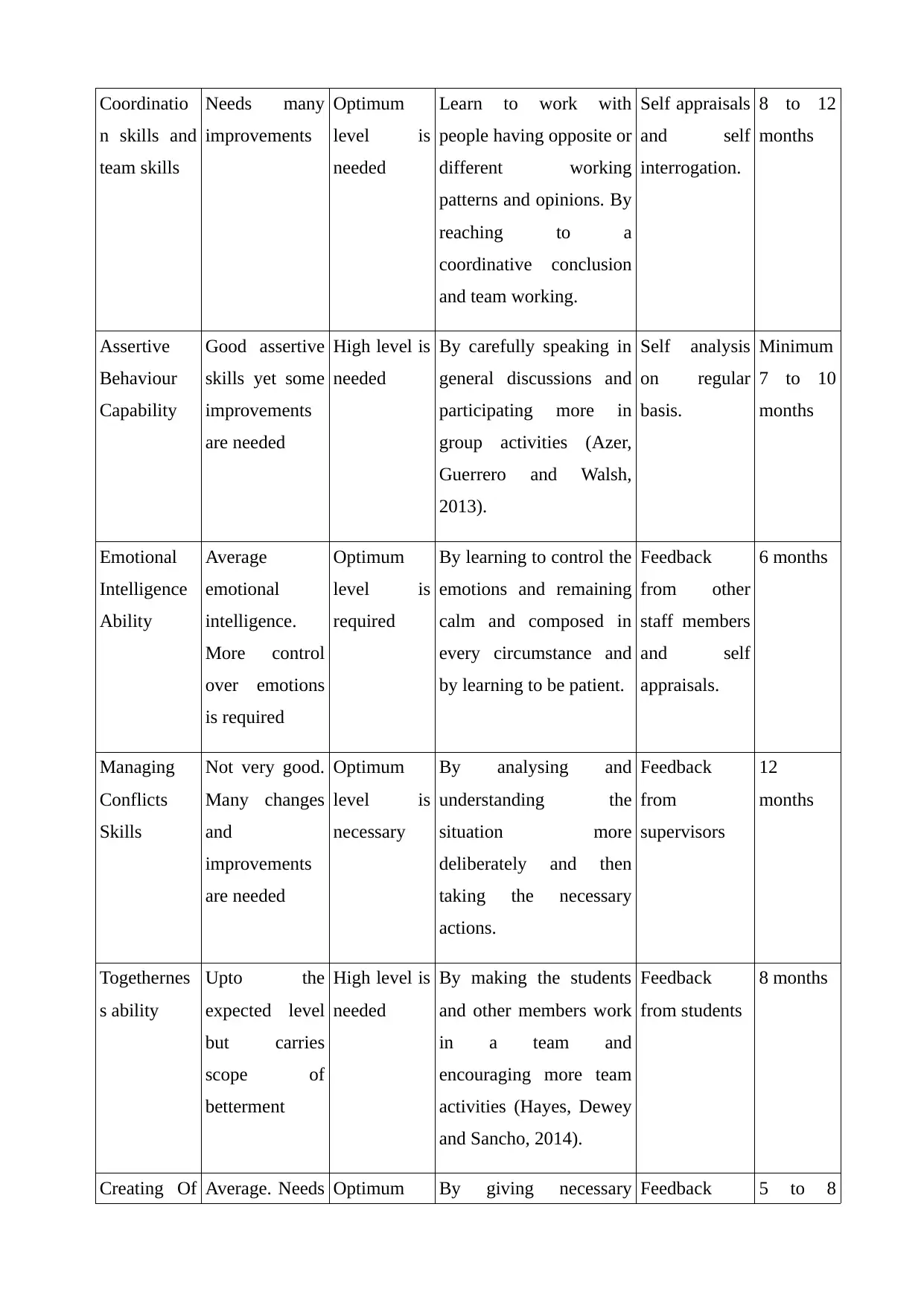
Coordinatio
n skills and
team skills
Needs many
improvements
Optimum
level is
needed
Learn to work with
people having opposite or
different working
patterns and opinions. By
reaching to a
coordinative conclusion
and team working.
Self appraisals
and self
interrogation.
8 to 12
months
Assertive
Behaviour
Capability
Good assertive
skills yet some
improvements
are needed
High level is
needed
By carefully speaking in
general discussions and
participating more in
group activities (Azer,
Guerrero and Walsh,
2013).
Self analysis
on regular
basis.
Minimum
7 to 10
months
Emotional
Intelligence
Ability
Average
emotional
intelligence.
More control
over emotions
is required
Optimum
level is
required
By learning to control the
emotions and remaining
calm and composed in
every circumstance and
by learning to be patient.
Feedback
from other
staff members
and self
appraisals.
6 months
Managing
Conflicts
Skills
Not very good.
Many changes
and
improvements
are needed
Optimum
level is
necessary
By analysing and
understanding the
situation more
deliberately and then
taking the necessary
actions.
Feedback
from
supervisors
12
months
Togethernes
s ability
Upto the
expected level
but carries
scope of
betterment
High level is
needed
By making the students
and other members work
in a team and
encouraging more team
activities (Hayes, Dewey
and Sancho, 2014).
Feedback
from students
8 months
Creating Of Average. Needs Optimum By giving necessary Feedback 5 to 8
n skills and
team skills
Needs many
improvements
Optimum
level is
needed
Learn to work with
people having opposite or
different working
patterns and opinions. By
reaching to a
coordinative conclusion
and team working.
Self appraisals
and self
interrogation.
8 to 12
months
Assertive
Behaviour
Capability
Good assertive
skills yet some
improvements
are needed
High level is
needed
By carefully speaking in
general discussions and
participating more in
group activities (Azer,
Guerrero and Walsh,
2013).
Self analysis
on regular
basis.
Minimum
7 to 10
months
Emotional
Intelligence
Ability
Average
emotional
intelligence.
More control
over emotions
is required
Optimum
level is
required
By learning to control the
emotions and remaining
calm and composed in
every circumstance and
by learning to be patient.
Feedback
from other
staff members
and self
appraisals.
6 months
Managing
Conflicts
Skills
Not very good.
Many changes
and
improvements
are needed
Optimum
level is
necessary
By analysing and
understanding the
situation more
deliberately and then
taking the necessary
actions.
Feedback
from
supervisors
12
months
Togethernes
s ability
Upto the
expected level
but carries
scope of
betterment
High level is
needed
By making the students
and other members work
in a team and
encouraging more team
activities (Hayes, Dewey
and Sancho, 2014).
Feedback
from students
8 months
Creating Of Average. Needs Optimum By giving necessary Feedback 5 to 8
⊘ This is a preview!⊘
Do you want full access?
Subscribe today to unlock all pages.

Trusted by 1+ million students worldwide
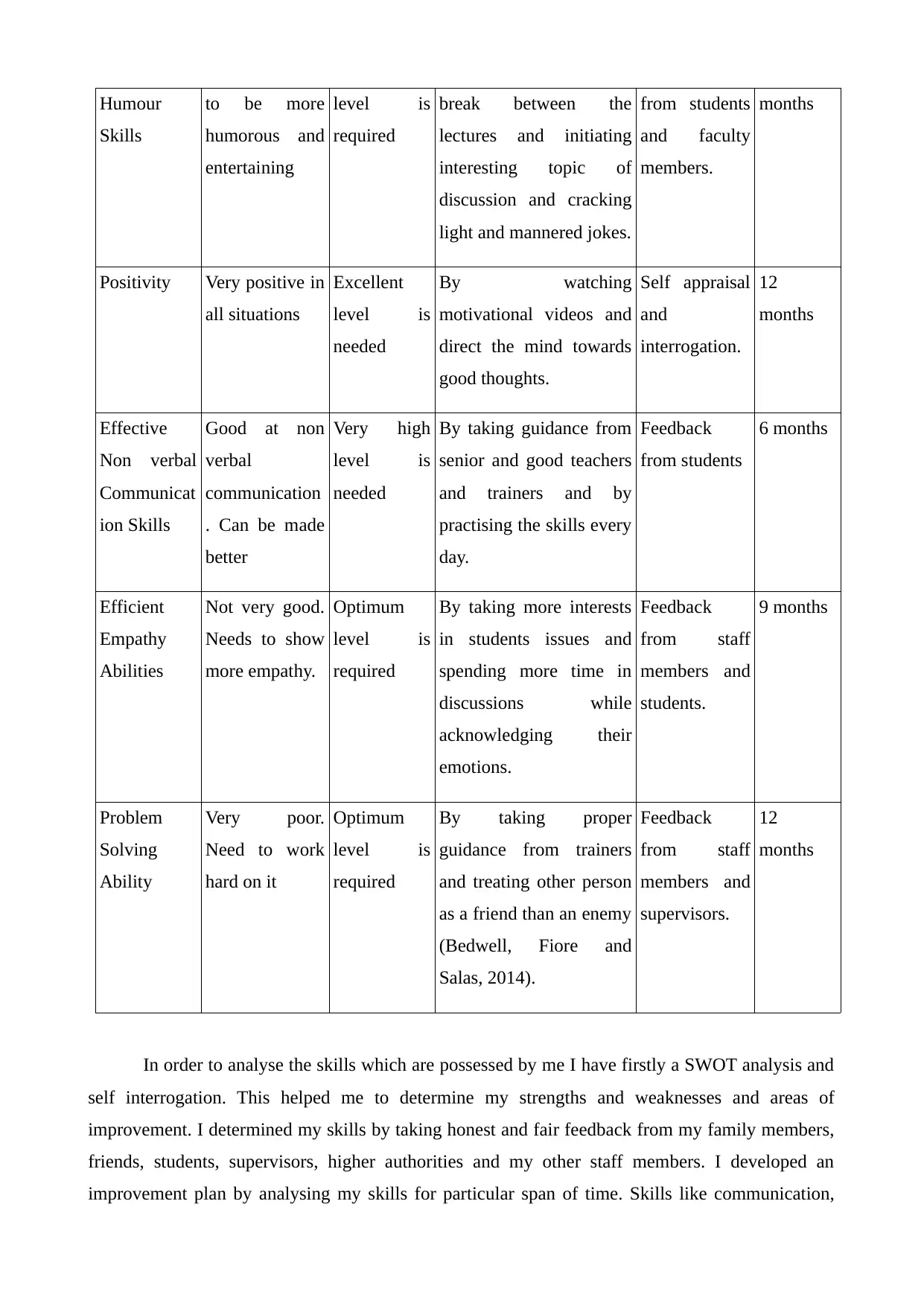
Humour
Skills
to be more
humorous and
entertaining
level is
required
break between the
lectures and initiating
interesting topic of
discussion and cracking
light and mannered jokes.
from students
and faculty
members.
months
Positivity Very positive in
all situations
Excellent
level is
needed
By watching
motivational videos and
direct the mind towards
good thoughts.
Self appraisal
and
interrogation.
12
months
Effective
Non verbal
Communicat
ion Skills
Good at non
verbal
communication
. Can be made
better
Very high
level is
needed
By taking guidance from
senior and good teachers
and trainers and by
practising the skills every
day.
Feedback
from students
6 months
Efficient
Empathy
Abilities
Not very good.
Needs to show
more empathy.
Optimum
level is
required
By taking more interests
in students issues and
spending more time in
discussions while
acknowledging their
emotions.
Feedback
from staff
members and
students.
9 months
Problem
Solving
Ability
Very poor.
Need to work
hard on it
Optimum
level is
required
By taking proper
guidance from trainers
and treating other person
as a friend than an enemy
(Bedwell, Fiore and
Salas, 2014).
Feedback
from staff
members and
supervisors.
12
months
In order to analyse the skills which are possessed by me I have firstly a SWOT analysis and
self interrogation. This helped me to determine my strengths and weaknesses and areas of
improvement. I determined my skills by taking honest and fair feedback from my family members,
friends, students, supervisors, higher authorities and my other staff members. I developed an
improvement plan by analysing my skills for particular span of time. Skills like communication,
Skills
to be more
humorous and
entertaining
level is
required
break between the
lectures and initiating
interesting topic of
discussion and cracking
light and mannered jokes.
from students
and faculty
members.
months
Positivity Very positive in
all situations
Excellent
level is
needed
By watching
motivational videos and
direct the mind towards
good thoughts.
Self appraisal
and
interrogation.
12
months
Effective
Non verbal
Communicat
ion Skills
Good at non
verbal
communication
. Can be made
better
Very high
level is
needed
By taking guidance from
senior and good teachers
and trainers and by
practising the skills every
day.
Feedback
from students
6 months
Efficient
Empathy
Abilities
Not very good.
Needs to show
more empathy.
Optimum
level is
required
By taking more interests
in students issues and
spending more time in
discussions while
acknowledging their
emotions.
Feedback
from staff
members and
students.
9 months
Problem
Solving
Ability
Very poor.
Need to work
hard on it
Optimum
level is
required
By taking proper
guidance from trainers
and treating other person
as a friend than an enemy
(Bedwell, Fiore and
Salas, 2014).
Feedback
from staff
members and
supervisors.
12
months
In order to analyse the skills which are possessed by me I have firstly a SWOT analysis and
self interrogation. This helped me to determine my strengths and weaknesses and areas of
improvement. I determined my skills by taking honest and fair feedback from my family members,
friends, students, supervisors, higher authorities and my other staff members. I developed an
improvement plan by analysing my skills for particular span of time. Skills like communication,
Paraphrase This Document
Need a fresh take? Get an instant paraphrase of this document with our AI Paraphraser
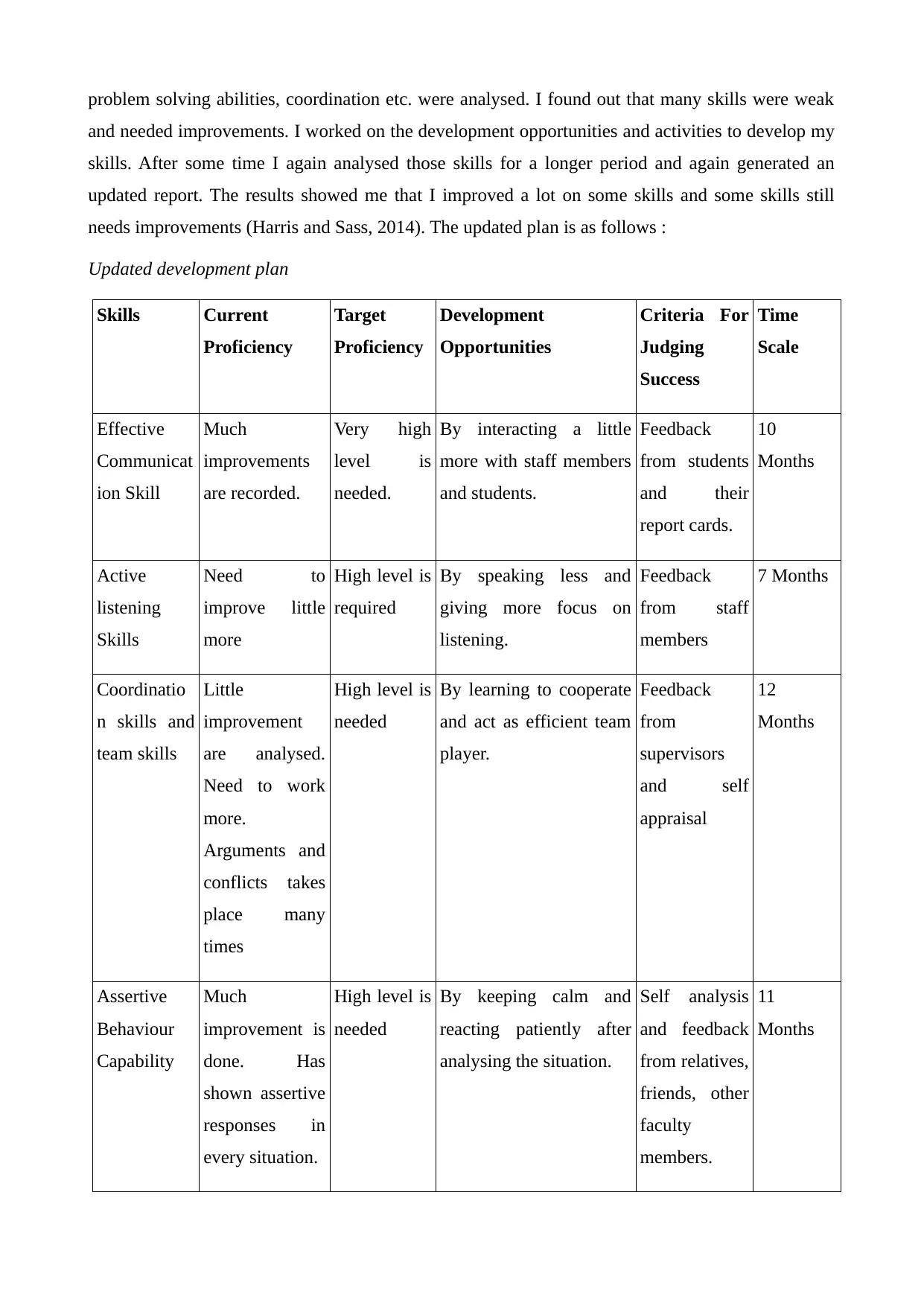
problem solving abilities, coordination etc. were analysed. I found out that many skills were weak
and needed improvements. I worked on the development opportunities and activities to develop my
skills. After some time I again analysed those skills for a longer period and again generated an
updated report. The results showed me that I improved a lot on some skills and some skills still
needs improvements (Harris and Sass, 2014). The updated plan is as follows :
Updated development plan
Skills Current
Proficiency
Target
Proficiency
Development
Opportunities
Criteria For
Judging
Success
Time
Scale
Effective
Communicat
ion Skill
Much
improvements
are recorded.
Very high
level is
needed.
By interacting a little
more with staff members
and students.
Feedback
from students
and their
report cards.
10
Months
Active
listening
Skills
Need to
improve little
more
High level is
required
By speaking less and
giving more focus on
listening.
Feedback
from staff
members
7 Months
Coordinatio
n skills and
team skills
Little
improvement
are analysed.
Need to work
more.
Arguments and
conflicts takes
place many
times
High level is
needed
By learning to cooperate
and act as efficient team
player.
Feedback
from
supervisors
and self
appraisal
12
Months
Assertive
Behaviour
Capability
Much
improvement is
done. Has
shown assertive
responses in
every situation.
High level is
needed
By keeping calm and
reacting patiently after
analysing the situation.
Self analysis
and feedback
from relatives,
friends, other
faculty
members.
11
Months
and needed improvements. I worked on the development opportunities and activities to develop my
skills. After some time I again analysed those skills for a longer period and again generated an
updated report. The results showed me that I improved a lot on some skills and some skills still
needs improvements (Harris and Sass, 2014). The updated plan is as follows :
Updated development plan
Skills Current
Proficiency
Target
Proficiency
Development
Opportunities
Criteria For
Judging
Success
Time
Scale
Effective
Communicat
ion Skill
Much
improvements
are recorded.
Very high
level is
needed.
By interacting a little
more with staff members
and students.
Feedback
from students
and their
report cards.
10
Months
Active
listening
Skills
Need to
improve little
more
High level is
required
By speaking less and
giving more focus on
listening.
Feedback
from staff
members
7 Months
Coordinatio
n skills and
team skills
Little
improvement
are analysed.
Need to work
more.
Arguments and
conflicts takes
place many
times
High level is
needed
By learning to cooperate
and act as efficient team
player.
Feedback
from
supervisors
and self
appraisal
12
Months
Assertive
Behaviour
Capability
Much
improvement is
done. Has
shown assertive
responses in
every situation.
High level is
needed
By keeping calm and
reacting patiently after
analysing the situation.
Self analysis
and feedback
from relatives,
friends, other
faculty
members.
11
Months
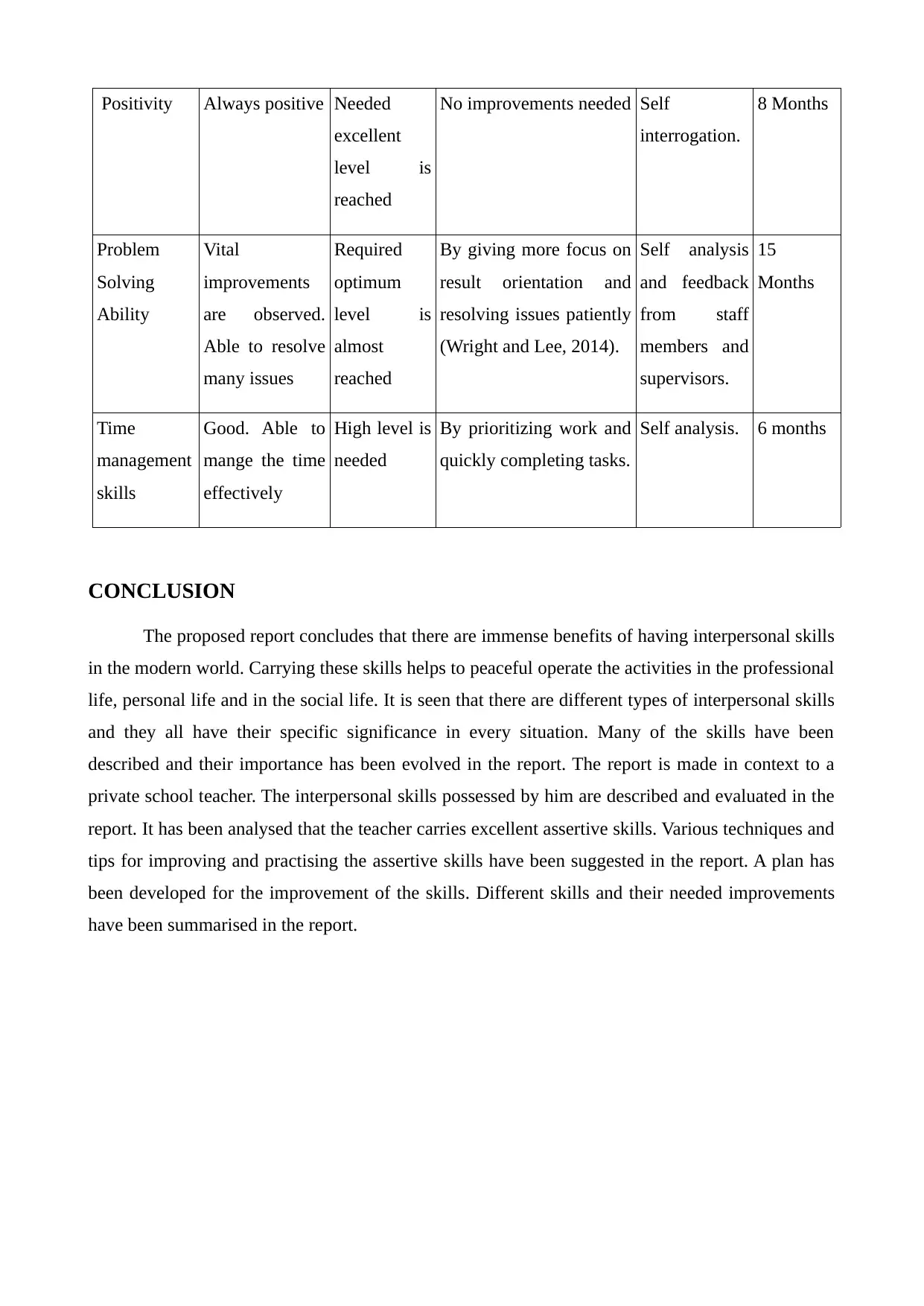
Positivity Always positive Needed
excellent
level is
reached
No improvements needed Self
interrogation.
8 Months
Problem
Solving
Ability
Vital
improvements
are observed.
Able to resolve
many issues
Required
optimum
level is
almost
reached
By giving more focus on
result orientation and
resolving issues patiently
(Wright and Lee, 2014).
Self analysis
and feedback
from staff
members and
supervisors.
15
Months
Time
management
skills
Good. Able to
mange the time
effectively
High level is
needed
By prioritizing work and
quickly completing tasks.
Self analysis. 6 months
CONCLUSION
The proposed report concludes that there are immense benefits of having interpersonal skills
in the modern world. Carrying these skills helps to peaceful operate the activities in the professional
life, personal life and in the social life. It is seen that there are different types of interpersonal skills
and they all have their specific significance in every situation. Many of the skills have been
described and their importance has been evolved in the report. The report is made in context to a
private school teacher. The interpersonal skills possessed by him are described and evaluated in the
report. It has been analysed that the teacher carries excellent assertive skills. Various techniques and
tips for improving and practising the assertive skills have been suggested in the report. A plan has
been developed for the improvement of the skills. Different skills and their needed improvements
have been summarised in the report.
excellent
level is
reached
No improvements needed Self
interrogation.
8 Months
Problem
Solving
Ability
Vital
improvements
are observed.
Able to resolve
many issues
Required
optimum
level is
almost
reached
By giving more focus on
result orientation and
resolving issues patiently
(Wright and Lee, 2014).
Self analysis
and feedback
from staff
members and
supervisors.
15
Months
Time
management
skills
Good. Able to
mange the time
effectively
High level is
needed
By prioritizing work and
quickly completing tasks.
Self analysis. 6 months
CONCLUSION
The proposed report concludes that there are immense benefits of having interpersonal skills
in the modern world. Carrying these skills helps to peaceful operate the activities in the professional
life, personal life and in the social life. It is seen that there are different types of interpersonal skills
and they all have their specific significance in every situation. Many of the skills have been
described and their importance has been evolved in the report. The report is made in context to a
private school teacher. The interpersonal skills possessed by him are described and evaluated in the
report. It has been analysed that the teacher carries excellent assertive skills. Various techniques and
tips for improving and practising the assertive skills have been suggested in the report. A plan has
been developed for the improvement of the skills. Different skills and their needed improvements
have been summarised in the report.
⊘ This is a preview!⊘
Do you want full access?
Subscribe today to unlock all pages.

Trusted by 1+ million students worldwide
1 out of 13
Related Documents
Your All-in-One AI-Powered Toolkit for Academic Success.
+13062052269
info@desklib.com
Available 24*7 on WhatsApp / Email
![[object Object]](/_next/static/media/star-bottom.7253800d.svg)
Unlock your academic potential
Copyright © 2020–2026 A2Z Services. All Rights Reserved. Developed and managed by ZUCOL.




